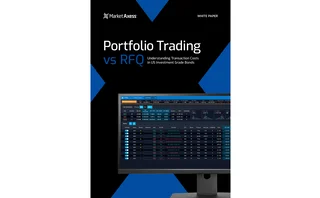Firms Prep Increased Regulation in Europe and the US
The Post-Crisis Mode

I attended a lunch with a UK Member of Parliament (MP) this month, and when commenting on where the regulatory environment seems to be going, it was all about the fact that the UK appears to be in a mindset to work with Europe – a very active Europe.
Jonathan Evans, MP and newly elected chairman of the All Party Parliamentary Group on Insurance and Financial Services in the UK, said: "In post-financial crisis work, we're going to see significantly more European activity."
This did not come as a surprise. It seems to be impossible to go to any data management event without talking about potential future impact of regulation nowadays. In the London market, meetings about MiFID II are rapidly becoming more frequent, and firms are still awaiting more details on Basel III.
At our continental European financial information summits in Copenhagen and Paris, regulation and standards also underpinned the majority of the discussions (see pages 1 and 8). In Paris, panelists discussing integrated data management ended up talking about the growing regulatory focus on data quality, and the potential for regulators to mandate the use of more standards as opposed to putting in new infrastructures.
In the US, the change in infrastructure already seems to be on the agenda, resulting in banks currently running internal meetings to assess the potential impact. The focus continues to be on what the set-up of the proposed government-run reference data and analysis centre, the Office of Financial Research, could mean for each organization.
This was further looked into at the Sifma Technology Expo Show in New York, where my colleague Carla Mangado heard speakers debating the impracticalities of attempting to manage systemic risk by collecting all this data and aggregating it in one massive repository (see feature page 20). It is not the preferred option by all market participants.
In fact, these types of major infrastructure changes, which seem to be happening everywhere at the moment, really get people talking. In the UK, the first significant change may be the planned split of the regulator the Financial Services Authority. For data managers in the UK, the main complaint I've heard about the current regulatory system has been the large piles of documents produced by the FSA, with some saying that just over the Christmas period there were hundreds of pages to read for anyone working in the client data space.
Evans, the MP, said the current system may have been committed to consultation, but in reality it has been committed to burying people in paper. "I hope what we don't do is go back to the structure with the FSA with the consultation paper," he said.
I think our entire industry, representing the professionals who have to read and interpret all these documents, would agree with that—particularly if the regulators continue in this post-crisis activist mode.
Only users who have a paid subscription or are part of a corporate subscription are able to print or copy content.
To access these options, along with all other subscription benefits, please contact info@waterstechnology.com or view our subscription options here: http://subscriptions.waterstechnology.com/subscribe
You are currently unable to print this content. Please contact info@waterstechnology.com to find out more.
You are currently unable to copy this content. Please contact info@waterstechnology.com to find out more.
Copyright Infopro Digital Limited. All rights reserved.
As outlined in our terms and conditions, https://www.infopro-digital.com/terms-and-conditions/subscriptions/ (point 2.4), printing is limited to a single copy.
If you would like to purchase additional rights please email info@waterstechnology.com
Copyright Infopro Digital Limited. All rights reserved.
You may share this content using our article tools. As outlined in our terms and conditions, https://www.infopro-digital.com/terms-and-conditions/subscriptions/ (clause 2.4), an Authorised User may only make one copy of the materials for their own personal use. You must also comply with the restrictions in clause 2.5.
If you would like to purchase additional rights please email info@waterstechnology.com
More on Trading Tech
DORA flood pitches banks against vendors
Firms ask vendors for late addendums sometimes unrelated to resiliency, requiring renegotiation
IPC’s C-suite shuffle signals bigger changes for trader voice tech
Waters Wrap: After a series of personnel changes at the legacy provider, WatersTechnology examines what these moves might mean for the future of turrets and trader voice.
WatersTechnology latest edition
Check out our latest edition, plus more than 12 years of our best content.
From no chance to no brainer: Inside outsourced trading’s buy-side charm offensive
Previously regarded with hesitancy and suspicion by the buy side, four asset managers explain their reasons for embracing outsourced trading.
Band-aids vs build-outs: Best practices for exchange software migrations
Heetesh Rawal writes that legacy exchange systems are under pressure to scale to support new asset classes and greater volumes, leaving exchange operators with a stark choice: patch up outdated systems and hope for the best or embark on risky but rewarding replacement projects.
Portfolio trading vs RFQ: Understanding transaction costs in US investment-grade bonds
The MarketAxess research team explores how such factors as order size, liquidity profiles and associated costs determine whether a portfolio trade or an RFQ list trade is the optimal choice.
IEX, MEMX spar over new exchange’s now-approved infrastructure model
As more exchanges look to operate around-the-clock venues, the disagreement has put the practices of market tech infrastructure providers under a microscope.
The Waters Cooler: The Thanksgiving debrief
Maybe we shouldn’t use AI for EVERYTHING! I’m talking to YOU, Spotify!







